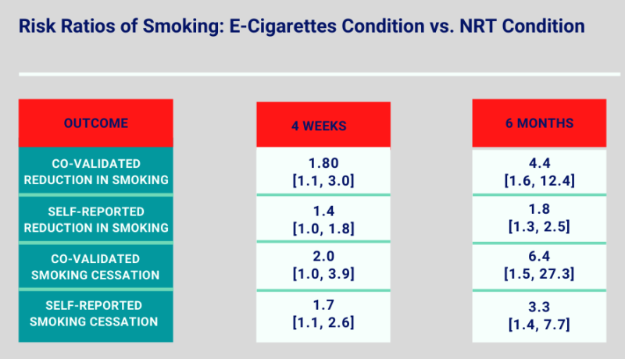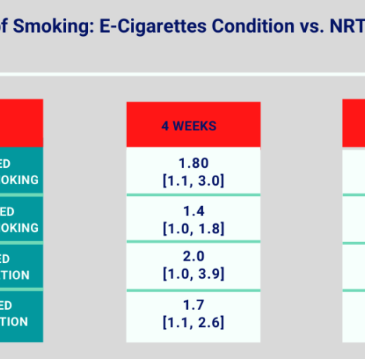For many people, quitting smoking is one feat of self-control after another. First comes the nicotine withdrawal, disrupting your appetite, mood, and sleep. Then comes the constant triggers as you go about routines that used to involve smoking. Finally, there is a stressful event, where smoking feels like the perfect way to take the edge off…
No wonder around 80% of those who engage in smoking cessation treatment relapse within a year. Nicotine replacement therapy (NRT; e.g., nicotine gum, patches, or nasal sprays), which eliminates exposure to carcinogens without requiring abstinence from nicotine, is the standard treatment for those who find smoking cessation difficult. However, NRT is expensive and may require consistent support from healthcare professionals to sustain recovery. In this edition of ASHES, we review an open-access study by Katie Myers Smith and colleagues that used a randomized controlled trial to examine whether e-cigarettes are more likely than NRT to result in smoking cessation.
What was the research question?
Are e-cigarettes a better cessation aid than NRT for those who find it difficult to quit?
What did the researchers do?
Using social media and a treatment center in London, England, the researchers recruited and randomly assigned 135 smokers with a history of unsuccessful attempts to quit smoking to receive either e-cigarettes or NRT (NRT participants chose if they wanted to use a nicotine patch, chew nicotine gum, or use some other NRT product). One week, four weeks, and six months later, the researchers contacted participants to see (a) if they were still using the cessation aid and (b) how many cigarettes they were smoking per day. Those who reported having reduced their cigarette use were also invited to confirm it with a carbon monoxide reading. The researchers used binomial regressions to assess differences on outcomes between the two groups.
What did they find?
More participants in the e-cigarette condition than the NRT condition experienced a reduction in cigarette use. Participants using e-cigarettes were 1.8 times more likely to report a reduction in cigarette smoking than participants assigned to NRT condition, a statistically significant difference (see Figure). Also, more participants sustained their use of e-cigarettes (41.7%) than NRT (10.5%) across six months, suggesting that e-cigarettes could be a more sustainable cessation aid.

Figure. CO-validated = Self-reported changes in smoking that were verified by carbon monoxide readings. Reduction in smoking = Smoking at least 50% fewer cigarettes than at the beginning of the study. The coefficients are risk ratios where the percentage of participants in the e-cigarette condition who reduced smoking are in the numerator, while the percentage in the NRT condition who reduced smoking are in the denominator. Thus, the positive signs imply that e-cigarettes were more effective in reducing smoking than the NRT methods. The numbers in brackets are 95% confidence intervals. All risk ratios have p-values ≤ .05. Click image to enlarge.
Why do these findings matter?
Smoking e-cigarettes is likely a more cost-effective quitting aid than NRT, and more appealing to some smokers than NRT. However, e-cigarettes do contain toxicants and may have harmful long-term effects that scientists do not yet know about. Ideally, people would quit e-cigarettes after successfully transitioning to smoking abstinence. But even if they do not, e-cigarettes are still likely much less dangerous than cigarettes.
Every study has limitations. What are the limitations of this study?
This study only recruited smokers who have had trouble quitting in the past. The advantage of e-cigarettes over NRT may be smaller for smokers who find quitting easier. Also, participants were recruited from a treatment center in London and social media, therefore it is unclear how well these results would generalize to a broader population.
For more information:
SmokeFree offers tools and tips for quitting and maintaining abstinence from smoking tobacco. The Centers for Disease Control and Prevention also provides research and tips about cigarettes and how to quit. For more details about addiction, visit our Addiction Resources page.
— William McAuliffe, Ph.D.
What do you think? Please use the comment link below to provide feedback on this article.




